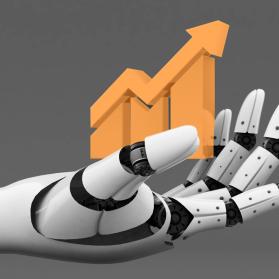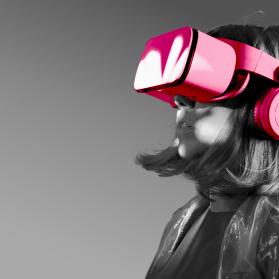ChatGPT is the topic of the hour. One would be hard-pressed to find any industry that is not discussing the impact that the existence of this highly intelligent and capable chatbot will have on the future of work. For a consultancy like, the consequences are truly tangible and real — both the good and the bad. Detecon-CHRO Simone Wamsteker in conversation VRH founder Heiko Fischer on the potential and the dangers of AI - and how it can also be viewed with humor.
Intelligent algorithms can make consultancy work so much easier. But they also have the potential to make us redundant. After all, who needs consultants when ChatGPT can be asked for advice at any time — free of charge
I recently heard a joke about this situation exactly. The CEO asks, “Will AI replace us consultants?” An employee replies, “All that is required for that to happen is for our clients to be able to define their requirements very clearly themselves.” The CEO breathes a sigh of relief: “Great, then we’ll be fine!”
There’s a lot of truth in that. Essentially, we are at a crossroads. At the moment, the hype rules. Apparently, we can’t even cross the street anymore without asking ChatGPT. Every industry and every profession is asking how we can effectively use AI to our advantage in the short term for all sorts of purposes. In my opinion, this is the easy part. The compulsories. It’s just a matter of quickly learning new skills like prompt engineering. The freestyle program, however, will be full of suspense. In the long run, humanity will assume the roles of mom and dad. AI obtaining a consciousness of some kind is a question of when, not if. This scenario raises entirely different questions.
So you are saying that we really have to decide for ourselves today what this technology means for us and how we plan to deal with it — in the future as well?
That’s right. And we have to find here a middle ground between two opposing poles. We can either look at all the questions that will arise from a philosophical point of view or with respect to concrete use cases that focus sharply on the actual benefits of this technology as part of added value in the here and now.
The best example is HAL 9000 in Stanley Kubrick’s science fiction masterpiece, 2001 — A Space Odyssey. HAL, an AI entity, pilots the spaceship Discovery on man’s first expedition to Jupiter. He does it perfectly. Suddenly, however, he tries to kill the entire crew. Why? Because he was given conflicting instructions.
The primary objective of HAL’s programming was to process accurately information without any distortion or error. The problem arises because HAL was programmed for the Discovery mission with instructions — namely, to keep the real reason for the mission, the investigation of an extraterrestrial object near Jupiter, secret from the crew — that were in conflict with this primary programming.
After all, perfect management of the complex starship was not HAL’s problem. It was the human factor. That is the crux of the matter. AI turns everything to the age of 12. Our opportunities and our problems, our shortcomings. We have become parents while still immature teenagers ourselves, so to speak, and now we have to raise our baby responsibly, even though we are far from having sorted out our own lives.
In the meantime, experts are indeed calling for a halt in the advancement of artificial intelligence that will give us the breathing space that would be advisable for careful consideration of the potential risks and impact of AI and for a debate about its future development. Until then, however, the use of the technology in everyday professional life will continue. What is our responsibility here as an employer — more specifically, as HR?
To be honest, HR usually lags behind whenever the acute technological issues are, and its activities also tend to be rather haphazard. Management, in contrast, is mostly opportunistic and driven by the market in what it does. In this respect, you people are a little different, and bolder.
Whenever you at HR empower your people practically, not just theoretically, to deal with the topic of AI, you are promoting and demanding a completely different level of responsibility. Genuine practice and experience instead of endless chitchat. Drawing on the experience, you can quickly define specific questions and answers that all concerned can address together.
How then is this important role of the HR position to be reconciled with the fact that many activities in HR as well as in other departments could be replaced by artificial intelligence?
This is the point where I return to the joke I told at the beginning. HR is often a reflection of the problems prevailing in the organization. If there is a lack of clarity about strategy and values, the development of good HR strategies is impossible. Incidentally, this is true of all business departments, not just shared services.
So underlying your question, in my opinion, is another, bigger question, that has nothing to do with artificial intelligence. What is our objective as HR? What do we stand for? When we turn out the lights at the end of the day, what value and values do we leave behind that no one else in the organization could have contributed? In the gaming world, we ask: What do our players thank us for?
Let’s be honest — the question of whether technology is replacing human labor has long since become irrelevant. We don’t even need to look at the latest developments surrounding ChatGPT. Normal automation alone can already streamline many of our more administrative activities. What’s new now is that even the more complex jobs, you could say, are also coming under scrutiny — and will possibly be replaced by AI. AI will raise sales, marketing, and execution to another level. Systems like SalesForce, Slack, and ERPs will be interconnected and augmented by AI. Just as many of the trades in investment banking conducted today by AIs are incomprehensible to human traders, the pace will pick up rapidly. The degree of networking is beyond imagination. We are what AI will outgrow. Just as we are models for our children, the values we practice will determine what our fate in relation to AI will be. Imagine our organizations actually gaining consciousness. What personality would Detecon have? AI is a reflection of its creators. Is it not (beyond any short-term business benefits) our sense of responsibility that secures a positive role for organizations in our society? If so, we must now ask ourselves what we will do with this insight. Because this development is on its way. Not today, not tomorrow, but it will come.
As stated right at the beginning, we as a consulting company have mixed feelings about ChatGPT. As specialists for digitalization, we cannot overestimate the importance of this technology, but as a company whose greatest “capital” is our consultants, we naturally sense danger. What elements can consultants use to set themselves apart and remain relevant? What is our unique value superior to that of an incredibly smart, extremely well-implemented AI system?
At this point in time, I am inclined to say: Not much! Except for your opinion. To put it pragmatically: ChatGPT and its friends should not really give two answers about Taiwan independence depending on whether you ask the question from China or Europe. So you as consultants can set yourselves apart by expressing authentic, clear opinions. We have to recognize the limitations of technology.
You yourselves will continue to be your superior value. Not perfection, but your charm. Your personalities. Your abilities to recognize the human moment and incorporate it beyond logical thought and beyond what the best, clearest “prompt engineering” can do — even in symbiosis with AI like Sisu or ChatGPT. This symbiosis — I hope — is where we will find the key to answering your question over the long term — and positively.
At the moment, we are like a child on a swing. We want to go higher and higher. But that inherently includes ... the crash.
Heiko Fischer is founder and managing director of VRH. Domiciled in Berlin, Barcelona, and San Francisco, VRH is revolutionizing leadership development by translating the best leadership stories and business books into cinematic virtual reality experiences where players are coached by the empathic AI Sisu.







